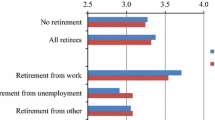Abstract
We examine determinants of financial and subjective well-being, in particular poverty and depression, among older individuals in Europe. We do so using the 2004, 2006, and 2010 waves of the Survey of Health Ageing and Retirement in Europe and estimating dynamic panel data and binary choice transition models. We find a number of common effects across financial and subjective well-being. Unemployment, disabilities, serious health conditions, lower education, being female, and not being married increase the probability of poverty or depression. Conversely, healthy individuals, those with higher levels of education, males, and married individuals have higher probabilities of exiting poverty or depression. The effect of retirement is of special policy interest. It turns out to be crucial to control for endogeneity (i.e. the possibility of reverse causality) of retirement. If we don’t control for endogeneity, retirement appears to increase both the risk of poverty and of depression. Once we control for endogeneity using instrumental variables, these negative effects disappear and point to weak evidence that retirement induced through eligibility for retirement pensions may be protective against poverty and depression.


Similar content being viewed by others
Notes
Social exclusion is often defined as the lack of opportunities and resources such as housing, employment or health care (Sen 2000).
The main source for this data was Coe and Zamarro (2011). The official retirement ages refer to the law that was in place when respondents in SHARE were facing retirement decisions. Although some countries have started introducing policies to increase statutory retirement ages these reforms are very recent and did not affect the cohorts in our study. The only exception is Italy, where early retirement age increased to 60 in the last wave of data.
This paper uses data from SHARE wave 4 release 1.1.1, as of March 28th 2013 or SHARE wave 1 and 2 release 2.6.0, as of November 29th 2013 or SHARELIFE release 1, as of November 24th 2010. The SHARE data collection has been primarily funded by the European Commission through the 5th Framework Programme (project QLK6-CT-2001-00360 in the thematic programme Quality of Life), through the 6th Framework Programme (projects SHARE-I3, RII-CT-2006-062193, COMPARE, CIT5-CT-2005-028857, and SHARELIFE, CIT4-CT-2006-028812) and through the 7th Framework Programme (SHARE-PREP, N° 211909, SHARE-LEAP, N° 227822 and SHARE M4, N° 261982). Additional funding from the U.S. National Institute on Aging (U01 AG09740-13S2, P01 AG005842, P01 AG08291, P30 AG12815, R21 AG025169, Y1-AG-4553-01, IAG BSR06-11 and OGHA 04-064) and the German Ministry of Education and Research as well as from various national sources is gratefully acknowledged (see www.share-project.org for a full list of funding institutions).
SHARE retention rates with regard to the longitudinal part of the sample are about 73 % and refreshment samples were drawn each wave to increase net sample size and compensate for attrition in the longitudinal sample (See e.g. Borsch-Supan et al. 2013)
To check for the validity of the instrumented used, we report Hansen/Sargan test statistics. The Hansen/Sargan test is used to check for the validity of the instruments used in an over-identified model. In particular, this test is based on the fact that the residuals should be uncorrelated with the set of exogenous variables if the instruments are truly exogenous. If we reject this hypothesis we cast doubt on the validity of the instrument set. The hypothesis cannot be rejected for any of our models at the 99 % confidence level and only one of them, IV model for the discrete transition of exit out of depression, we can reject the null hypothesis at the 95 % confidence level.
References
Ahn, N. (2005). Financial consequences of widowhood in Europe: cross country and gender differences. CEPS ENEPRI, Working Paper No. 32.
Allardt, E. (1978). The relationship between objective and subjective measures in the light of a comparative study. In R. F. Tomassen (Ed.), Comparative studies in sociology. Greenwich, CT: JAI Press.
Angelini, V., Brugiavini, A., & Weber, G. (2009). Ageing and unused capacity in Europe: is there an early retirement trap? Economic Policy, 59, 463–508.
Atchley, R. C. (1976). The sociology of retirement. Cambridge, MA: Schenkman Publishing Company.
Barnett, R. C., & Hyde, J. S. (2001). Women, men, work, and family. American Psychologist, 56, 781.
Blane, D. (2006). The life course, the social gradient, and health. In M. Marmot & R. G. Wilkinson (Eds.), Social determinants of health, 2nd ed (p. 54–77). Oxford: Oxford University Press.
Börsch-Supan, A., Brandt, M., Hunkler, C., Kneip, T., Korbmacher, J., Malter, F., et al. (2013). Data resource profile: the Survey of Health, Ageing and Retirement in Europe (SHARE). International Journal of Epidemiology [Epub ahead of print].
Bound, J., & Waidmann, T. (2007). Estimating the health effects of retirement. University of Michigan Retirement Research Center, Working Paper No. 2007–168.
Carney, R. M., Blumenthal, J. A., Catelier, D., Freedland, K. E., Berkman, L. F., Watkins, L. L., Czajkowski, S. M., Hayano, J., & Jaffe, A. S. (2003). Depression as a risk factor for mortality after acute myocardial infarction. American Journal of Cardiology, 92, 1277–1281.
Charles, K. (2002). Is retirement depressing? Labor force inactivity and psychological well-being in later life. NBER Working Paper No. 9033.
Coe, N., & Zamarro, G. (2011). Retirement effects on health in Europe. Journal of Health Economics, 30, 77–86.
Dewey, M. E., & Prince, M. J. (2005). “Mental Health”. In Börsch-Supan et al. (Eds.), Health, Ageing and Retirement in Europe. First Results from the Survey of Health, Ageing and Retirement in Europe (pp. 108–117). Mannheim Germany: Mannheim Research Institute for the Economics of Aging (MEA).
Doyle, C., & Hind, P. (1998). Occupational stress, burnout and job status in female academics. Gender, Work & Organization, 5, 67–82.
Duxbury, L., Higgins, C., & Lee, C. (1994). Work-family conflict a comparison by gender, family type, and perceived control. Journal of Family Issues, 15, 449–466.
Easterlin, R. A. (2005). Feeding the illusion of growth and happiness: a reply to Hagerty and Veenhoven. Social Indicators Research, 74, 429–443.
Engelhardt, G., & Gruber, J. (2004). Social security and the evolution of elderly poverty. National Bureau of Economic Research, Working Paper No.10466.
Engelhardt, G., Gruber, J., & Perry, C. (2005). Social security and elderly living arrangements: evidence from the social security notch. The Journal of Human Resources, 40, 354–357.
Gjoinca, E., Tabassum, F., & Breeze, E. (2006). The socio-demographic characteristics of the ELSA population. In J. Banks et al. (Eds.), Retirement, health, and relationships of the older population in England. London: Institute for Fiscal Studies.
Gruber, J., & Wise, D.A. (eds.) (1999). Social security and retirement around the world. Chicago: University of Chicago Press.
Halleröd, B., Örestig, J., Stattin, M. (2012). Leaving the labour market: the impact of exit routes from employment to retirement on health and wellbeing in old age. European Journal of Ageing, 1–11.
Hoff, A. (2008). Tackling poverty and social exclusion of older people—lessons from Europe. Oxford Institute of Ageing Working Papers, No. 308.
Hurd, M., & Wise, D. (1991). Changing social security survivorship benefits and the poverty of widows. National Bureau of Economic Research, Working Paper No. 3843.
Kapteyn, A., Smith, J., & van Soest, A. (2010). Life satisfaction. In E. Diener, J. Helliwell, & D. Kahneman (Eds.), International differences in well-being (pp. 70–104). Oxford: Oxford University Press.
Kim, J. E., & Moen, P. (2001). Is retirement good or bad for subjective well-being? Current Directions in Psychological Science, 10, 83–86.
Layard, R. (2005). Rethinking Public Economics: The Implications of Rivalry and Habit. In P. L. Porta & L. Bruni (Eds.), Economics and happiness (pp. 147–169). Oxford: Oxford University Press.
Mack, J., & Lansley, S. (1985). How poor is too poor? Defining poverty. In J. Mack & S. Lansley (Eds.), Poor Britain. London: George Allen & Unwin.
Mein, G. M., Martikainen, P., Hemingway, H., Stansfeld, S., & Marmot, M. (2003). Is retirement good or bad for mental and physical health functioning? Whitehall II longitudinal study of civil servants. Journal of Epidemiology and Community Health, 57, 46–49.
Neuman, K. (2008). Quit your job and live longer? The effect fo retirement on health. Journal of Labor Research, 29(2).
OECD. (2008). Growing unequal? Income distribution and poverty in OECD countries. Paris: Organisation for Economic Co-operation and Development.
OECD. (2011). Pensions at a glance. Paris: Organisation for Economic Co-operation and Development.
Ogg, J. (2005). Social exclusion and insecurity among older Europeans: the influence of welfare regimes. Ageing and Society, 25.
Oxley, H., Dang, T., & Antolin, P. (2000). Poverty dynamics in six OECD countries. OECD Economic Studies, 30.
Prince, M., Reischies, F., Beekman, A., Fuhrer, R., Jonker, C., Kivela, S., Lawlor, B., Lobo, A., Magnusson, H., Fichter, M., Van Oyen, H., Roelands, M., Skoog, I., Turrina, C., & Copeland, J. (1999). Development of the Euro-D scale—a European Union initiative to compare symptoms of depression in 14 European centres. British Journal of Psychiatry, 174, 330–338.
Quandagno, J. (2011). Aging and the life-course: an introduction to social gerontology (5th ed.). New York: McGraw-Hill.
Rohwedder, S., & Willis, R. (2010). Mental retirement. Journal of Economic Perspectives, 24, 119–138.
Rupp, K., Strand, A., & Davies, P. S. (2003). Poverty among elderly women: assessing SSI options to strengthen social security reform. The Journals of Gerontology Series B: Psychological Sciences and Social Sciences, 58, S359–S368.
Sandell, S. H., & Iams, H. M. (1997). Reducing women’s poverty by shifting social security benefits from retired couples to widows. Journal of Policy Analysis and Management, 16.
Sen, A. (1973). On economic inequality. Reprinted in 1997 by Clarendon Press, Oxford, UK.
Sen, A. (1997). Maximization and the act of choice. Econometrica, 65(4), 745–749.
Sen, A. (2000). Social exclusion: concept, application and scrutiny. Social Development papers 1. Asian Development Bank.
Steffens, D. C., Otey, E., Alexopoulos, G. S., Butters, M. A., Cuthbert, B., Ganguli, M., Geda, Y. E., Hendrie, H. C., Krishnan, R. R., Kumar, A., Lopez, O. L., Lyketsos, C. G., Mast, B. T., Morris, J. C., Norton, M. C., Peavy, G. M., Petersen, R. C., Reynolds, C. F., Salloway, S., Wesh-Bohmer, K. A., & Yesavage, J. (2006). Perspectives on depression, mild cognitive impairment, and cognitive decline. Archives of General Psychiatry, 63, 130–138.
Stiglitz, J.E., Sen, A., Fitoussi, J.-P. (2009). Report by the commission on the measurement of economics performance and social progress. www.stiglitz-sen-fitoussi.fr.
Szinovacz, M. E., & Davey, A. (2004). Retirement transitions and spouse disability: effects on depressive symptoms. Journals of Gerontology Series B: Psychological and Social Sciences, 59, S333–S342.
Tinbergen, J. (1991). On the measurement of welfare. Journal of Economics, 50, 7–13.
Townsend, P. (1962). The meaning of poverty. British Journal of Sociology, 13, 210–227.
Van Praag, B. M. S., Frijters, P., & Ferrer-i-Carbonell, A. (2003). The anatomy of subjective well-being. Journal of Economic Behavior and Organization, 51, 29–49.
Zaidi, A. (2010). Poverty risk for older people in EU countries—an update. Vienna: European Centre for Social Welfare Policy and Research.
Zaidi, A., Grech, A.G., Fuchs, M. (2006) Pension policy in EU25 and its possible impact on elderly poverty. Centre for Analysis of Social Exclusion CASE, Working Paper, 116.
Acknowledgments
This research was supported by the National Institute on Aging, under grant 2P01AG022481 “International Comparisons of Well-Being, Health and Retirement” and 2R01AG030153 “Integration Information about Aging Surveys”. We thank Caroline Tassot for her excellent research assistance.
Author information
Authors and Affiliations
Corresponding author
Rights and permissions
About this article
Cite this article
Fonseca, R., Kapteyn, A., Lee, J. et al. A Longitudinal Study of Well-Being of Older Europeans: Does Retirement Matter?. Population Ageing 7, 21–41 (2014). https://doi.org/10.1007/s12062-014-9094-7
Received:
Accepted:
Published:
Issue Date:
DOI: https://doi.org/10.1007/s12062-014-9094-7




